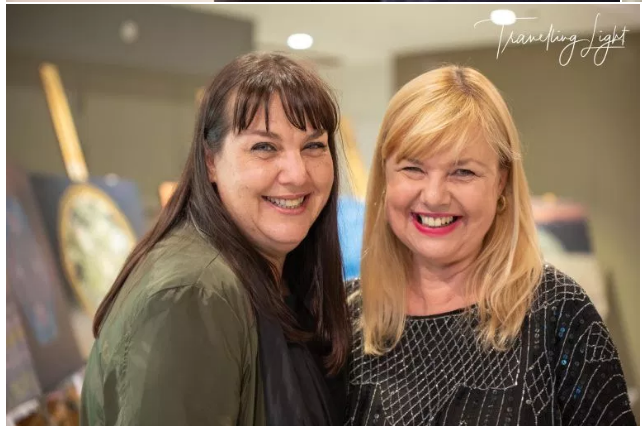By Rachael Merritt | @rachael_liz_m
Artistic Director, Monica Curro (left), and Founder, Caroline Neeling (right) at the Women in Music Festival.
Photo credit: Michelle Myers
The inaugural Women in Music Festival celebrates the talent and often underrepresented work of female musicians and composers across five music genres- indigenous, games, classical, film and jazz.
Launching for the first time at RMIT Storey Hall on the weekend of International Women’s Day, the two-day festival produced a line-up of live music with nightly performances and afternoon markets featuring small businesses run by women.
Festival founder, Caroline Neeling, launched the idea of an all-female festival after noticing the gender imbalance in music festivals she was involved with.
In a recent festival where Neeling was appointed Vice- President, only four out of forty pieces presented were written by female composers.
“That’s just not good enough,” Neeling told Catalyst News.
“I was saddened further to see that this is the case across the world. In Australia, 25 per cent of classical composers are women and yet only 3-5 per cent of (concert) performances are pieces by women. I wasn’t very happy with the statistic,” Neeling said.
Enlisting Melbourne Symphony Orchestra violinist and founding member of music ensemble PLEXUS, Monica Curro, as the festival’s Artistic Director, the pair pulled together an ensemble of female musicians, composers and multidisciplinary artists across the five music genres they believe women are least represented.
Performers included Australian operatic soprano, Greta Bradman, jazz performer Michelle Nicolle, sound designer and audio programmer Maize Wallin and storyteller and musician Rachel Shields, a descendant of the Weilwan and Gamilario peoples of North Western New South Wales.
Florida born composer, Jessica Wells, debuted an original film score, commissioned for the festival, to the silent film Neptune’s Daughter, starring swimmer, actress and women’s advocate, Annette Kellerman.
“Women in film are really the underdogs in the industry and really have struggled to get any notice and get work,” Wells said.
In a 2017 report, APRA AMCOS, the music rights organisation representing over 100,000 songwriters, composers and music publishers, revealed that females constituted only 21.7 per cent of membership.
Within this category, statistics for women composing for screen and film are even more polarising in terms of gender representation, with females making up 13 per cent of registered screen composers.
The findings of the report detail that women composers, despite being highly educated, are less likely to win professional accolades, have equal opportunities and ultimately maintain a sustainable career in the field.
“We all go study, we do masters degrees, we learn our craft… then when we come out of studying, we struggle to get work,” she said.
Wells said it’s “definitely not easy” pursuing a career in the music industry as well as being a caregiver to her two children, aged 10 and 12.
“Trying to feed a baby in a high chair with three people on my kitchen floor sticky taping music together for a recording session, it’s not easy,” she said.
Wells remains positive the industry is undergoing change, she told Catalyst News there currently “couldn’t be a better time” for women to enter the industry.
However, it’s a bittersweet revelation for both Wells and Neeling that much of the responsibility lies upon the work of independent, private events and festivals, such as the Women in Music Festival, to provide women a platform to exhibit compositions which fall outside mainstream music genres.
Neeling said the Women in Music Festival was a “positive outcome” to supporting women composers and another avenue to show audiences that “compositions by women are equally beautiful and equally strong and equally meaningful”.


